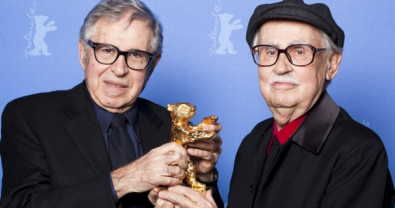Filmic Victory: The Taviani Brothers surprised themselves and others with the impact of their new film
The Berlinale’s Golden Bear to Paolo and Vittorio Taviani, two masters of Italian cinema (respectively 80 and 82), for Caesar Must Die, sheds a new light on the contemporary Italian film scene, and perhaps on Italy as a whole. In a moment when Italy seems to struggle to live up to its glorious past, this prestigious international recognition is felt not only as a well-deserved appreciation of the Taviani brothers’ outstanding work, but as a sign of encouragement to a whole country. “Many people, after the award ceremony, thanked us on behalf of Italy, as if this prize were a prize to Italy” – says Paolo Taviani. “One even called us on the phone and said: ‘Thanks! I’ve hung the Italian flag out of my window!’ This is a tricky moment for our country. People believe it’s time for a change, they hope for a turning point. So this film, which is quite anomalous, somehow complies with these wishes.”
Besides sparking off a new wave of expectations and national pride, the film is in itself a valuable and original project able to provide an insight into our contemporary reality through an unprecedented combination of anti-naturalistic choices, literary references and neorealist sensitivity. The film was shot at Rome’s Rebibbia maximum-security prison, where the inmates, under the supervision of their “intern” director Fabio Cavalli, take on the challenge to stage Shakespeare’s Julius Caesar. The film follows the development of the project, from the casting to the inmates- actors’ personal exploration of the text, to their rehearsals and final performance on the prison’s stage.
A universal story of friendship, betrayal, power, freedom and murder, Shakespeare’s play intertwines with the convicts’ personal histories, made up of misdeeds, faults, offences, crimes and broken relationships. Several of these inmates-actors once were actually ‘men of honor’, affiliates to different kinds of mobs – mafia, Camorra, ndrangheta – and sentenced in most of the cases to life imprisonment. The continuous references to the ‘men of honor’ in Mark Antony’s speech at Caesar’s funeral therefore take on a whole different and deeper meaning. Such is the adherence of Shakespeare’s play to the prisoners’ life experiences that reality and fiction seem to bleed into each other, with great dramatic and even cathartic effects. “On the day we shot the sequence of the killing of Caesar – recall the directors – we asked our dagger-armed actors to find the same killer urge within them. A second later we realized what we had just said and we wished we could withdraw our words. But that wasn’t necessary because they were the first ones to reckon the necessity to face reality.”
A further powerful element of reality into the fictional setting of Shakespeare’s drama is the choice of having the characters talk in the different dialects of the inmates. So we see them squabble in Neapolitan, whisper and shout in Sicilian or Apulian, while acting between wards, stairs, cubicles, yard and cells. Far from belittling the high tone of the tragedy, the dialectal mispronunciation of the lines provides them with a new truth, allowing a deeper connection between characters and actors. “With all due respect for Shakespeare (who has always been a father, a brother and then – as we grew older – a son for us), we have taken over his Julius Caesar, dismembered and rebuilt it. We have certainly kept the spirit of the original tragedy as well as the narrative, but at the same time we simplified it taking it a bit far from the traditional stage work tempos. The result is a degenerate son that Shakespeare would have certainly loved!”
Passing from color to a high-contrast black and white, the authors recreate Shakespeare’s atmosphere in the unusual set of the Rebibbia prison, while avoiding the risk of falling into an affected naturalism. This aesthetic choice is in fact an ethical one: because, it is only stressing out the fictional nature of the performance, the intrusion of the camera into the confined spaces of the prison, that the physical and human reality of the convicts can only emerge. It is only through Brutus’ longing for freedom that we are allowed to hear other voices that normally have no right to speak.
The Taviani brothers’ film however goes beyond that: having Caesar killed not against the backdrop of ancient Rome but in the tiny cubicles where the inmates spend their time in the open air not only brings reality into the film, thus making it visible, but brings the film into the reality of the convicts, changing it forever. “Since I have known art, this cell has turned into a prison”, says the actor playing Cassius at the end of the film. In this sense, Caesar Must Die is a hymn to the liberating power of culture and art, a timeless and timely story of redemption and salvation.
Laura Giacalone is the Associate Editor for the Italian Journal.
